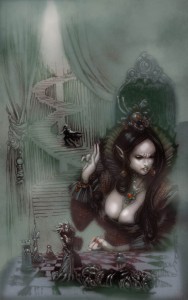So after the fiasco of the previous night, you'd think I would stay in and sleep it off, right? Fucking wrong. 4 hours of sleep, then up, shower, and down to the registration area, and shortly thereafter to a Changeling the Lost game run by The Wrecking Crew. I feel the need to put in a few notes here.
First, I was on the design team for the CtL corebook. However, I had never actually played the game or even managed to read all the way through the book, as ironic as that is. So I was interested to see what the final product ended up being like.
Second, The Wrecking Crew is awesome. They run tabletop games for White Wolf products at all sorts of conventions. Back in the day they used to help White Wolf with the setup and breakdown of their booths at said conventions, too. They are not only rabid fans, but they are very good at what they do. So I was doubly excited to play in this game.
Third, I was still vaguely nauseas, hadn't eaten since 3pm the previous day, and hadn't even had any water that morning. But I am not a little bitch, and I was determined to get my game on. So instead of doing the intelligent thing and saying, "Hey guys, give me 5 minutes to go get a bottle of water," I toughed through it. HTFU.
–Begin geeky game reminiscing–
 The game had pregens, I was the last to the table but I found a great character: an Autumn Court librarian. Autumn Court changelings are the creepy ones. The girl running the game left the specifics to us, so I described him as a spindly man in his late 40s with straight, almost dead-looking black hair that was about chin-length, who had the musty smell of old books. He had sunken eyes, wore a moth-ridden tweed jacket, ivory button-down shirt, and brown corduroy pants. Also, from time to time a spider or two would skitter out from the hair hanging at his neck, scamper across his neck or face, and disappear on the other side.
The game had pregens, I was the last to the table but I found a great character: an Autumn Court librarian. Autumn Court changelings are the creepy ones. The girl running the game left the specifics to us, so I described him as a spindly man in his late 40s with straight, almost dead-looking black hair that was about chin-length, who had the musty smell of old books. He had sunken eyes, wore a moth-ridden tweed jacket, ivory button-down shirt, and brown corduroy pants. Also, from time to time a spider or two would skitter out from the hair hanging at his neck, scamper across his neck or face, and disappear on the other side.
His mein (how he looks to other changelings) was much the same, except instead of eyes he had black pits that seemed to suck in the light, features even more gaunt to the point of looking skeletal, and elongated teeth that were all sharp canines.
The basic plot was that the group of us "came to" on a dock with a wooden crate in front of us, and a person, with no memories of the previous 24 hours. The person was contractually bound not to tell us anything. My character snooped and sniffed around, and figured that there was most likely a dead body in there. Around that time, a car drove up and we were shot at. My character, not being a fighter, hid and used his powers to freak out the gunmen — or at least one of them.
We gain control of the situation, find out who hired them, then go up the chain to find out who hired that person to hire them, find out who that person was working for. It was basically a big court plot to make it look like the Autumn Court queen was abducting/killing the other three courts' queens, the plot lead by someone who hoped to take her place, and was working with the True Fae (bad, bad news) to do so. We blew up the would-be queen, I did some research on the fae and found her weakness (she is known as the Weeping Willow, and can't attack anyone that's crying), and the local changelings banded together to smack her down.
Behind the scenes, apparently we were hired by the current Autumn queen to investigate the disappearances. I'd thought maybe we were the ones that had caused them, since we did "wake up" in front of a box with a dead body in it that I was pretty sure was one of the other queens, after all.
–End geeky game reminiscing–
 After that, Lauren, Charles Bailey, and I went to grab brunch. I wanted some gumbo (it's New Orleans after all, and I love me some cajun food), so on the advice of friends we went to Gumbo Shop. Yes, it's a gumbo place called Gumbo Shop. It was pretty good, except that they put a crab claw in mine and there were little bits of it in the gumbo itself that I had to spit out from time to time. I found them, of course, by crunching down on them with my teeth, which was none too pleasant.
After that, Lauren, Charles Bailey, and I went to grab brunch. I wanted some gumbo (it's New Orleans after all, and I love me some cajun food), so on the advice of friends we went to Gumbo Shop. Yes, it's a gumbo place called Gumbo Shop. It was pretty good, except that they put a crab claw in mine and there were little bits of it in the gumbo itself that I had to spit out from time to time. I found them, of course, by crunching down on them with my teeth, which was none too pleasant.
 Then we went to a gelato place right around the corner, and it was divine. Lauren and I got some horchata gelato. They had some single malt Glenlivet gelato that I really wanted, but thought might be a bad idea after the previous night's debacle.
Then we went to a gelato place right around the corner, and it was divine. Lauren and I got some horchata gelato. They had some single malt Glenlivet gelato that I really wanted, but thought might be a bad idea after the previous night's debacle.
We helped Charles find a geocaching thing, then I caught the tail end of an artist panel and we went out to eat again.
What? I have a tapeworm to feed, you know. Or a hollow leg to fill. Or both.
We really wanted to check out The Green Goddess, since it seems to have great Yelp reviews and some of our friends raved about it. By "we wanted to go" I mostly mean that I did, and Lauren grumbled about it. Turns out, it was too packed anyway — it is but a tiny place, not capable of handling even the runoff of the crowds that the convention brought. So we ended up at House of Blues, where I had some shrimp and catfish creole. Though we had to wait a long time to get our food, it was very tasty, and the waitress was awesomely nice as well. I will definitely go back there whenever I'm next in the area.
Damnit, even writing about this is making me hungry. Maybe if I lived in New Orleans I'd actually gain a few pounds.
That night there was a… well, cocktail party is the best way I can think to describe it, at the Blue Room downstairs. CCP was giving the fans a chance to talk to some of the game developers, and have some nice snacks and free booze while they were at it.
This seemed to translate to "OMGfreebooze!!!!" and instead of talking to the developers, everyone seemed to go straight for the two bars, resulting in about a 45 minute wait to get drinks. I chatted some with Rich Thomas, Bill Bridges, and others before deciding to move along to bed.
Thus ended day 2. Not terribly exciting, but it involved good food, and the next day was the birthday party, so I knew adventure awaited. And indeed it did, but more on that in the next installment.




